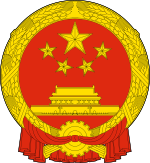Main article: History of the People's Republic of China
| History of the People's Republic of China (PRC) |
|---|
 |
| History of |
| Generations of leadership |
Mao Zedong proclaiming the establishment of the PRC in 1949
The regime consolidated its popularity among the peasants through land reform, which saw between 1 and 2 million landlords executed.[106] Under its leadership, China developed an independent industrial system and its own nuclear weapons.[107] The Chinese population almost doubled from around 550 million to over 900 million.[108] However, the Great Leap Forward, a large-scale economic and social reform project, resulted in an estimated 45 million deaths between 1958 and 1961, mostly from starvation.[109] In 1966, Mao and his allies launched the Cultural Revolution, sparking a decade of political recrimination and social upheaval which lasted until Mao's death in 1976. In October 1971, the PRC replaced the Republic of China in the United Nations, and took its seat as a permanent member of the Security Council.[110]
After Mao's death, the Gang of Four was quickly arrested and held responsible for the excesses of the Cultural Revolution. In 1978 Deng Xiaoping took power and instituted significant economic reforms. The Communist Party loosened governmental control over citizens' personal lives, and the communes were gradually disbanded in favor of private land leases. This marked China's transition from a planned economy to a mixed economy with an increasingly open market environment.[111] China adopted its current constitution on 4 December 1982. In 1989, the violent suppression of student protests in Tiananmen Square brought condemnation and sanctions against the Chinese government from various countries.[112]
Jiang Zemin, Li Peng and Zhu Rongji led the nation in the 1990s. Under their administration, China's economic performance pulled an estimated 150 million peasants out of poverty and sustained an average annual gross domestic product growth rate of 11.2%.[113][114] The country formally joined the World Trade Organization in 2001, and maintained its high rate of economic growth under Hu Jintao and Wen Jiabao's leadership in the 2000s. However, rapid growth also severely impacted the country's resources and environment,[115][116] and caused major social displacement.[117][118] Living standards continued to improve rapidly despite the late-2000s recession, but centralized political control remained tight.[119]
Preparations for a decadal Communist Party leadership change in 2012 were marked by factional disputes and political scandals.[120] During China's 18th National Communist Party Congress in November 2012, Hu Jintao was replaced as General Secretary of the Communist Party by Xi Jinping.[121][122] Under Xi, the Chinese government began large-scale efforts to reform its economy,[123][124] which has suffered from structural instabilities and slowing growth.[125][126][127][128] The Xi–Li Administration also announced major reforms to the one-child policy and prison system.[129]

No comments:
Post a Comment